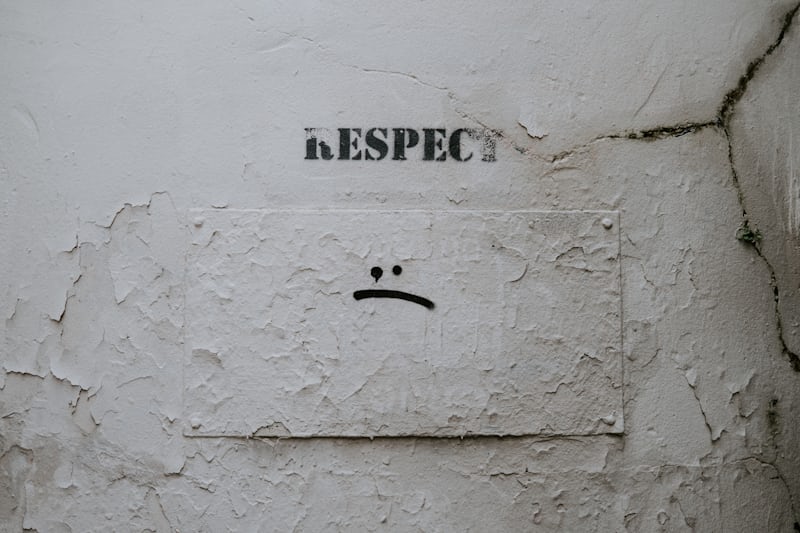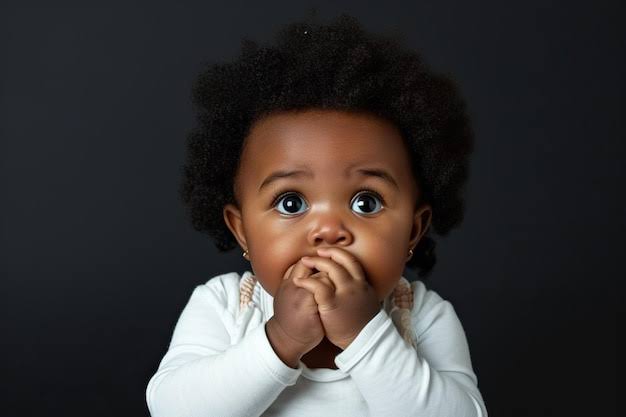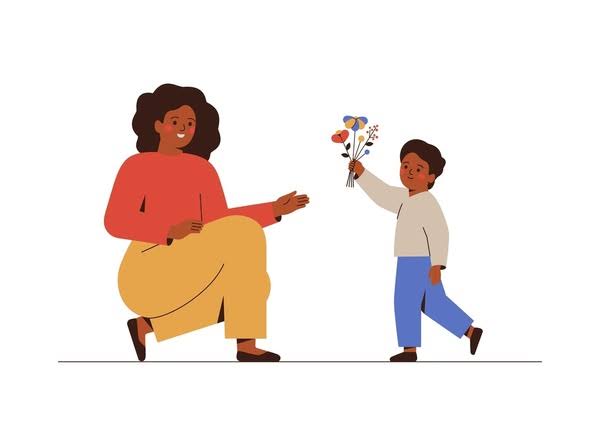Unpacking ‘Respect’ in African Homes: Fear or Love?

INTRODUCTION: The Silence Of Obedience
Imagine an atmosphere shift. A child, once laughing freely, lowers their voice. Another stiffens in their seat, eyes fixed on the ground. Why? An elder has entered the room, and without a word spoken, the unspoken law of “respect” takes over.
In countless African households, this ritual is as ordinary as mealtime. Children are taught not just to speak carefully, but to shrink themselves physically, emotionally, and verbally in the presence of elders.
But beneath this performance of reverence lies a deeper question: Is what we call "respect" truly rooted in love, or is it enforced by fear?
Across generations, African cultures have held tightly to the value of respect, treating elders with deference, never challenging authority, and always doing as told. But in the process, many young people have grown up confusing silence for character, obedience for goodness, and fear for discipline.
Defining ‘Respect’ In Context
In many African societies, the word “respect” carries a weight that transcends manners, it’s a moral compass, a measure of worth, and a cultural expectation ingrained from early childhood. But how exactly is respect defined? And at what point does it cross into something else entirely?

Photo Credit: Bellafricana
Traditionally, respect is expressed through obedience, silence, physical deference, and acts of service. Children kneel or prostrate when greeting elders. Eye contact is avoided. Opinions, especially dissenting ones, are often withheld. To question an elder is to invoke punishment. To speak out of turn is to invite rebuke; all of these capture the heart of a value system where hierarchy outweighs individuality, and age automatically commands authority.
True respect, by definition, involves recognition and appreciation of another’s humanity, wisdom, or experience. It is earned, not demanded. It allows for mutual dignity, even in disagreement. Yet, in many households, children are taught that respect means erasing themselves in the presence of an adult, regardless of how they are treated in return.
The Power Dynamics: Elders, Authority & Control
In the traditional African family structure, age equals authority. Elders are not just respected, they are revered, obeyed, and often unquestioned. From uncles to older siblings, this hierarchy grants those higher up the ladder an almost sacred immunity, while placing younger ones at the bottom of a rigid social order.
But age, in this context, doesn’t only bring wisdom; it brings power. And often, that power goes unchecked.
To question an elder’s words is to be insolent. To disagree is to “lack home training.” To set personal boundaries, whether emotional, physical, or even spiritual, is seen as rebellion. A young person who dares to say “no” or express discomfort is quickly labelled “proud,” “spoilt,” or worse: “disrespectful.”
Social Insight
Navigate the Rhythms of African Communities
Bold Conversations. Real Impact. True Narratives.
This dynamic is further complicated by layers of patriarchy, where male authority often supersedes female voices, and where “respect” can become a tool to silence, dismiss, or dominate. In such households, a father’s word is final—even if harmful. A mother’s exhaustion is dismissed because “that’s her role.” And a child’s opinion? Barely entertained.
At the heart of it all is an unspoken but widely accepted rule:
“Respect is demanded, not earned.”
In such environment, control often masquerades as culture. But the consequences, emotional repression, generational resentment, and trauma passed off as tradition, are far from benign.
When Fear Wears The Mask Of Respect
In many African homes, the line between respect and fear is not just blurred, it’s often not seen.
Take, for example, the child who hides their report card after scoring poorly not because they’re dishonest, but because they’re terrified of being beaten or shamed. Or the adult who’s gainfully employed, emotionally aware, and fully grown, yet still cannot speak openly with their parents about career choices, relationships, or mental health, for fear of being scolded, dismissed, or disowned.
These aren’t isolated experiences. They’re generational patterns deeply ingrained and widely accepted.

Photo Credit: Freepik
We’re taught that a “respectful” child is quiet, unquestioning, and obedient. But in reality, what’s often celebrated as discipline is sometimes just emotional suppression. Children grow into adults who bottle up trauma, avoid vulnerability, and carry invisible wounds all because they were raised to believe that speaking your truth dishonors your elders.
When fear wears the mask of respect, authenticity dies. Conversations become commands. Affection becomes obligation. And silence is mistaken for virtue.
But this begs a difficult question—can you truly respect someone you’re afraid of?
Respect rooted in fear is not reverence. It is survival. It breeds compliance, not connection. And in the long run, it builds emotional walls where love should have lived.
If respect is meant to nurture relationships, then fear, no matter how well-dressed in tradition, only poisons them.
THE MENTAL HEALTH TOLL
Social Insight
Navigate the Rhythms of African Communities
Bold Conversations. Real Impact. True Narratives.
The emotional silence that often defines “respectful” African homes does not come without consequence. In fact, the very systems that prize obedience over openness are frequently the same systems breeding anxiety, low self-worth, and emotional disconnection, often silently, and across generations.
In households where children are taught to suppress emotions to avoid being seen as “disrespectful,” emotional literacy is stunted. Vulnerability is mocked or punished. Mistakes are met not with dialogue, but discipline. Over time, this cultivates a learned behavior: hide what hurts, show only what’s safe.
Mental health practitioners across the continent also point to a rising trend, young African adults struggling with identity crises, people-pleasing behavior, and an inability to establish boundaries. Many trace their trauma back to childhoods spent “walking on eggshells” around emotionally unavailable or authoritarian parents.
But perhaps the most devastating impact is the internal conflict: being made to feel guilty for simply wanting to be understood.
In homes where fear is the default and emotional honesty is taboo, children learn to survive but not to connect. They become emotionally self-reliant, not by choice, but by necessity, mistaking numbness for strength, and emotional suppression for character.
This is not just discipline—it’s cultural emotional neglect, wrapped in the language of tradition.
Respect Reimagined: Love, Listening & Boundaries
What if respect didn’t have to mean silence? What if it could mean being heard, being safe, and being human even as a child?
Across the continent, more parents and caregivers are beginning to reimagine respect, not as fear-based obedience, but as mutual dignity. They are redefining it through empathy, emotional presence, and listening without judgment.
Respect, in this regard, looks like a father who allows his child to express frustration without taking it as defiance. A mother who chooses conversation over punishment. A home where apologies go both ways, and "because I said so" is replaced with "let’s talk about why."

Photo Credit: Shutterstock
And it’s not just parents leading the charge, youth voices are rising, too. Young Africans are pushing for a new definition of respect, one rooted in mutuality, not superiority. They are asking to be seen not as vessels for obedience, but as full humans worthy of dialogue, boundaries, and care.
This shift doesn’t dishonor tradition; it evolves it. It acknowledges that love without fear is not weakness, and that dignity is not reserved only for the aged. In this reimagining, respect is no longer a tool of silence; itbecomes a language of connection.
Culture Or Conditioning: What Should We Keep?
At the heart of this conversation lies a difficult but necessary question: What parts of our cultural understanding of “respect” are truly valuable and which ones are simply inherited patterns of control?
Social Insight
Navigate the Rhythms of African Communities
Bold Conversations. Real Impact. True Narratives.
Not every tradition is toxic. Many African customs are rooted in deep communal love, solidarity, and intergenerational wisdom. Respect for elders, for instance, can still hold space in modern life, but must it come at the cost of a child’s voice?
Can young Africans honor their elders while still expressing themselves?
The goal is not to erase our culture but to evolve it. To hold on to what serves us, and release what harms us. To recognize that silence does not equal meekness, and fear does not equal respect. And most importantly, to raise a generation that feels seen, safe, and empowered, not just well-behaved.
The future of African families must be built not just on cultural pride but on emotional truth, mutual respect, and healing.
Because tradition should not be a prison. It should be a foundation one we are allowed to question, rebuild, and rise from.
CONCLUSION: Fear Fades, but Love Lasts
In the end, the kind of respect that endures is not the one enforced by fear, but the one nurtured by love, trust, and understanding.
We must ask ourselves not just as individuals, but as families and communities, what kind of homes are we building? Are they spaces where children feel heard, or merely controlled? Do our traditions empower expression, or silence it?
True respect grows in spaces where love is louder than fear. Where obedience isn’t extracted through threats, but offered through trust. Where elders guide with grace, and the young speak without trembling.
This isn’t about rejecting our roots—it’s about watering them differently. Let’s raise a generation that understands that to be respected doesn’t require shrinking someone else. And let’s build homes where dignity is shared, not demanded.
“Respect rooted in fear may create obedience, but only respect rooted in love creates connection.”
Recommended Articles
IShowSpeed Takes Africa by Storm: Unforgettable Viral Moments from His Epic Tour!

Internet personality IShowSpeed embarked on a 28-day, 20-country "Speed Does Africa" tour to trace his heritage and show...
Global Recognition! Davido & Sanwo-Olu Set to Be Honored at Prestigious MIPAD 2025 Awards

The Most Influential People of African Descent (MIPAD) is bringing its renowned awards ceremony to Lagos, Nigeria, for t...
You may also like...
When Sacred Calendars Align: What a Rare Religious Overlap Can Teach Us

As Lent, Ramadan, and the Lunar calendar converge in February 2026, this short piece explores religious tolerance, commu...
Arsenal Under Fire: Arteta Defiantly Rejects 'Bottlers' Label Amid Title Race Nerves!

Mikel Arteta vehemently denies accusations of Arsenal being "bottlers" following a stumble against Wolves, which handed ...
Sensational Transfer Buzz: Casemiro Linked with Messi or Ronaldo Reunion Post-Man Utd Exit!

The latest transfer window sees major shifts as Manchester United's Casemiro draws interest from Inter Miami and Al Nass...
WBD Deal Heats Up: Netflix Co-CEO Fights for Takeover Amid DOJ Approval Claims!

Netflix co-CEO Ted Sarandos is vigorously advocating for the company's $83 billion acquisition of Warner Bros. Discovery...
KPop Demon Hunters' Stars and Songwriters Celebrate Lunar New Year Success!

Brooks Brothers and Gold House celebrated Lunar New Year with a celebrity-filled dinner in Beverly Hills, featuring rema...
Life-Saving Breakthrough: New US-Backed HIV Injection to Reach Thousands in Zimbabwe

The United States is backing a new twice-yearly HIV prevention injection, lenacapavir (LEN), for 271,000 people in Zimba...
OpenAI's Moral Crossroads: Nearly Tipped Off Police About School Shooter Threat Months Ago
ChatGPT-maker OpenAI disclosed it had identified Jesse Van Rootselaar's account for violent activities last year, prior ...
MTN Nigeria's Market Soars: Stock Hits Record High Post $6.2B Deal

MTN Nigeria's shares surged to a record high following MTN Group's $6.2 billion acquisition of IHS Towers. This strategi...
